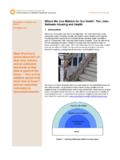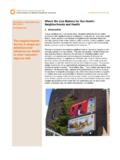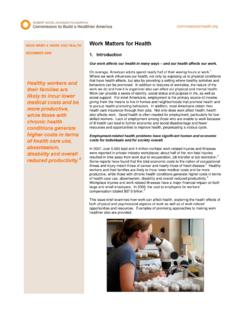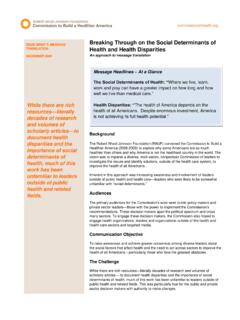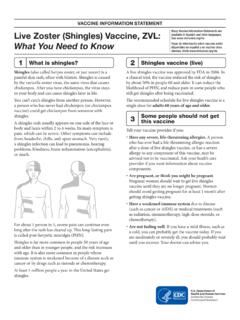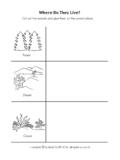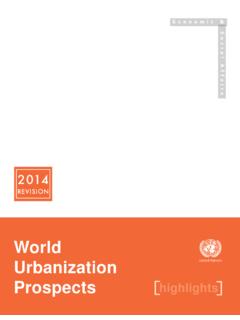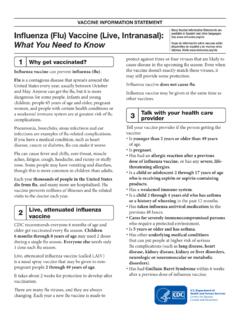Transcription of ISSUE BRIEF 6: EDUCATION AND Education Matters for Health ...
1 ISSUE BRIEF 6: EDUCATION AND Health SEPTEMBER 2009 EDUCATION Matters for Health Everyone knows that without a good EDUCATION , prospects for a good job with good earnings are slim. Few people think of EDUCATION as a crucial path to Health , however. Yet a large body of evidence strongly and, with very rare exceptions, consistently links EDUCATION with Health , even when other factors like income are taken into By EDUCATION we mean educational attainment, or the years or level of overall schooling a person has, rather than instruction on specific Health topics like hygiene, diet or exercise; while the quality of EDUCATION also is important for Health outcomes, this information is more difficult to measure and thus typically unavailable.
2 People with more EDUCATION are likely to live longer, to experience better Health outcomes (Figures 1 & 2), and to practice Health -promoting behaviors such as exercising regularly, refraining from smoking, and obtaining timely Health care check-ups and , 7-9 Educational attainment among adults is linked with children s Health as well, beginning early in life: babies of more-educated mothers are less likely to die before their first birthdays, and children of more-educated parents experience better Health (F igures 3 & 4). EDUCATION can influence Health in many ways. This ISSUE BRIEF examines three major interrelated pathways through which educational attainment is linked with Health : Health knowledge and behaviors; employment and income; and social and psychological factors, including sense of control, social standing and social support.
3 In addition, this BRIEF explores how educational attainment affects Health across generations, examining the links between parents EDUCATION and the social and economic advantages it represents and their children s Health and social advantages, including opportunities for educational attainment. A large body of evidence links EDUCATION with Health , even when other factors like income ar e taken into account. Page 2 People with more EDUCATION are likely to live longer and experience better Health outcomes.
4 , Non-HispanicHispanicA s ianAmerican Indian or AlaskaNativ eOther PERCENT OF ADULTS, AGES 25-74 YEARS, IN LESS THAN VERY GOOD Health *Figure 2. Less EDUCATION is linked with worse Health . Across racial or ethnic groups, adults with greater educational attainment are less likely to rate their Health as less than very good. Source: Behavioral Risk Factor Surveillance System Survey Data, 2005-2007. Based on self-report and measured as poor, fair, good, very good or excellent.* than high-school graduateHigh-school graduateSome collegeCollege graduateEducational AttainmentLess than high-school graduateHigh-school graduateSome collegeCollege graduateEducational AttainmentBLACK, NON-HISPANICHISPANICASIANAMERICAN INDIAN OR ALASKA NATIVEWHITE, NON-HISPANICBLACK, NON-HISPANICHISPANICASIANAMERICAN INDIAN OR ALASKA NATIVEWHITE, 1.
5 For both men and women, more EDUCATION typically means longer life. College graduates can expect to live at least 5 years longer than individuals who have not finished high : National Longitudinal Mortality Study, 1988-1998. This chart describes the number of years that adults in different EDUCATION groups can expect to live beyond age 25. For example, a 25-year-old man with only a high-school diploma can expect to live more years and reach an age of EXPECTANCY AT AGE 25 MENWOMENLess than high-school graduateHigh-school graduateSome collegeCollege graduateEducational AttainmentLess than high-school graduateHigh-school graduateSome collegeCollege graduateEducational Attainment Page 3 Educational attainment among adults is linked with children s Health as well, beginning early in life.
6 Years12 years13-15 years16 or more yearsMother s Educational Attainment0-11 years12 years13-15 years16 or more yearsMother s Educational AttainmentINFANT MORTALITY RATES (PER 100,000 LIVE BIRTHS)Source: Matthews TJ, MacDormanMF. Infant Mortality Statistics from the 2004 Period Linked Birth/Infant Death Dataset. National Vital Statistics Reports, vol55 no 15. Hyattsville, MD: National Center for Health Statistics, 2007. Figure 3. Infant mortality rates vary by mother s EDUCATION . Babies born to mothers who have not finished high school are nearly twice as likely to die before their first birthdays as babies born to college 4.
7 Parents EDUCATION is linked with children s Health . Children whose parents have not finished high school are more than six times as likely to be in poor or fair Health as children of college graduates. Source: National Health Interview Survey, 2001-2005. Based on parental assessment and measured as poor, fair, good, very good or excellent.* OF CHILDREN, AGES 17 YEARS, WITH POOR/FAIR Health *Less than high-school graduateHigh-school graduateSome collegeCollege graduateParent s Educational AttainmentLess than high-school graduateHigh-school graduateSome collegeCollege graduateParent s Educational Attainment Page 4 Low educational attainment is a major problem in this country.
8 In the United States overall, nearly 16 percent of adults ages 25 years and older have not completed high school, 30 percent have no schooling beyond high school, 27 percent have attended but not completed college, and 28 percent are college graduates (Figure 5). These overall percentages mask dramatic differences across racial or ethnic groups, however: for example, 50 percent of Asian and 31 percent of non-Hispanic white adults are college graduates, compared with 17 percent of non-Hispanic black and 13 percent of Hispanic and American Indian or Alaska Native adults. Approximately 30 percent of high-school freshmen in this country and nearly half of all freshmen in school systems in the 50 largest cities fail to graduate within four The likelihood of dropping out increases with decreasing income.
9 In 2007, for example, 17 percent of 16 to 24 year-olds from families in the lowest income quartile were not enrolled in high school and had not received a high-school credential, compared with 3 percent of those from families in the highest income At the same time, college has become increasingly unaffordable for low- and middle-income families. For the 2007-2008 school year, net college costs for a family in the lowest income quintile represented 55 percent of median family income, compared with 33 percent, 25 percent, 16 percent and 9 percent, respectively, for families in successively higher income In response to budget constraints.
10 At least 28 states have cut funding for public colleges and universities and/or substantially increased college tuitions in their 2009 fiscal year The United States is the only industrialized nation where young people currently are less likely than members of their parents generation to be high-school Given the changing demography of the country and the escalating costs of college, bold action will be needed to meet President Obama s goal of having the highest proportion of college graduates in the world by 2020. The United States is the only industrialized nation where young people currently are less likely than members of their parents generation to be high-school graduates.
